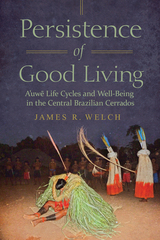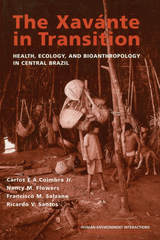3 books about Xavante Indians

Indigenous Struggle at the Heart of Brazil
State Policy, Frontier Expansion, and the Xavante Indians, 1937–1988
Seth Garfield
Duke University Press, 2001
Indigenous Struggle at the Heart of Brazil examines the dynamic interplay between the Brazilian government and the Xavante Indians of central Brazil in the context of twentieth-century western frontier expansion and the state’s indigenous policy. Offering a window onto Brazilian developmental policy in Amazonia and the subsequent process of indigenous political mobilization, Seth Garfield bridges historical and anthropological approaches to reconsider state formation and ethnic identity in twentieth-century Brazil.
Garfield explains how state officials, eager to promote capital accumulation, social harmony, and national security on the western front, sought to delimit indigenous reserves and assimilate native peoples. Yet he also shows that state efforts to celebrate Indians as primordial Brazilians and nationalist icons simultaneously served to underscore and redefine ethnic difference. Garfield explores how various other social actors—elites, missionaries, military officials, intellectuals, international critics, and the Indians themselves—strove to remold this multifaceted project. Paying particular attention to the Xavante’s methods of engaging state power after experience with exile, territorial loss, and violence in the “white” world, Garfield describes how they emerged under military rule not as the patriotic Brazilians heralded by state propagandists but as a highly politicized ethnic group clamoring for its constitutional land rights and social entitlements.
Indigenous Struggle at the Heart of Brazil will interest not only historians and anthropologists but also those studying nationbuilding, Brazil, Latin America, comparative frontiers, race, and ethnicity.
Garfield explains how state officials, eager to promote capital accumulation, social harmony, and national security on the western front, sought to delimit indigenous reserves and assimilate native peoples. Yet he also shows that state efforts to celebrate Indians as primordial Brazilians and nationalist icons simultaneously served to underscore and redefine ethnic difference. Garfield explores how various other social actors—elites, missionaries, military officials, intellectuals, international critics, and the Indians themselves—strove to remold this multifaceted project. Paying particular attention to the Xavante’s methods of engaging state power after experience with exile, territorial loss, and violence in the “white” world, Garfield describes how they emerged under military rule not as the patriotic Brazilians heralded by state propagandists but as a highly politicized ethnic group clamoring for its constitutional land rights and social entitlements.
Indigenous Struggle at the Heart of Brazil will interest not only historians and anthropologists but also those studying nationbuilding, Brazil, Latin America, comparative frontiers, race, and ethnicity.
[more]

Persistence of Good Living
A’uwe Life Cycles and Well-Being in the Central Brazilian Cerrados
James R. Welch
University of Arizona Press, 2023
Cultural understandings of well-being often differ from scientific measures such as health, happiness, and affluence. For the Indigenous A’uwẽ (Xavante) people in the tropical savannas of Brazil, special forms of intimate and antagonistic social relations, camaraderie, suffering, and engagement with the environment are fundamental aspects of community wellness.
Anthropologist James R. Welch transparently presents ethnographic insights from his long-term fieldwork in two A’uwẽ communities. He addresses how distinctive constructions of age organization contribute to social well-being in an era of major ecological, economic, and sociocultural change. Welch shows how A’uwẽ perspectives on the human life cycle help define ethnic identity, promote cultural resilience, and encourage the betterment of youth. They provide frameworks that people may creatively mobilize to responsibly and respectfully engage with others at different stages of life. They also motivate people to access and manage landscape resources essential to the social construction of good living. Through careful analysis, Welch shows how contemporary traditional peoples can foster enthusiasm for service to family and community amid dominant cultures that prioritize individual well-being.
This book is an essential resource for students and scholars interested in sociocultural anthropology, Indigenous cultures, health and culture, and human ecology.
Anthropologist James R. Welch transparently presents ethnographic insights from his long-term fieldwork in two A’uwẽ communities. He addresses how distinctive constructions of age organization contribute to social well-being in an era of major ecological, economic, and sociocultural change. Welch shows how A’uwẽ perspectives on the human life cycle help define ethnic identity, promote cultural resilience, and encourage the betterment of youth. They provide frameworks that people may creatively mobilize to responsibly and respectfully engage with others at different stages of life. They also motivate people to access and manage landscape resources essential to the social construction of good living. Through careful analysis, Welch shows how contemporary traditional peoples can foster enthusiasm for service to family and community amid dominant cultures that prioritize individual well-being.
This book is an essential resource for students and scholars interested in sociocultural anthropology, Indigenous cultures, health and culture, and human ecology.
[more]

The Xavante in Transition
Health, Ecology, and Bioanthropology in Central Brazil
Carlos E. A. Coimbra, Jr., Nancy M. Flowers, Francisco M. Salzano, and Ricardo V. Santos
University of Michigan Press, 2004
The Xavánte in Transition presents a diachronic view of the long and complex interaction between the Xavánte, an indigenous people of the Brazilian Amazon, and the surrounding nation, documenting the effects of this interaction on Xavánte health, ecology, and biology.
A powerful example of how a small-scale society, buffeted by political and economic forces at the national level and beyond, attempts to cope with changing conditions, this study will be important reading for demographers, economists, environmentalists, and public health workers.
". . . an integrated and politically informed anthropology for the new millennium. They show how the local and the regional meet on the ground and under the skin."
--Alan H. Goodman, Professor of Biological Anthropology, Hampshire College
"This volume delivers what it promises. Drawing on twenty-five years of team research, the authors combine history, ethnography and bioanthropology on the cutting edge of science in highly readable form."
--Daniel Gross, Lead Anthropologist, The World Bank
--Daniel Gross, Lead Anthropologist, The World Bank
"No doubt it will serve as a model for future interdisciplinary scholarship. It promises to be highly relevant to policy formulation and implementation of health care programs among small-scale populations in Brazil and elsewhere."
--Laura R. Graham, Professor of Anthropology, University of Iowa
--Laura R. Graham, Professor of Anthropology, University of Iowa
Carlos E. A. Coimbra Jr. is Professor of Medical Anthropology at the National School of Public Health, Rio de Janeiro.Nancy M. Flowers is Adjunct Associate Professor of Anthropology, Hunter College. Francisco M. Salzano is Emeritus Professor, Department of Genetics, Federal University of Rio Grande do Sul, Brazil. Ricardo V. Santos is Professor of Biological Anthropology at the National School of Public Health and at the National Museum IUFRJ, Rio de Janeiro.
[more]
READERS
Browse our collection.
PUBLISHERS
See BiblioVault's publisher services.
STUDENT SERVICES
Files for college accessibility offices.
UChicago Accessibility Resources
home | accessibility | search | about | contact us
BiblioVault ® 2001 - 2024
The University of Chicago Press









